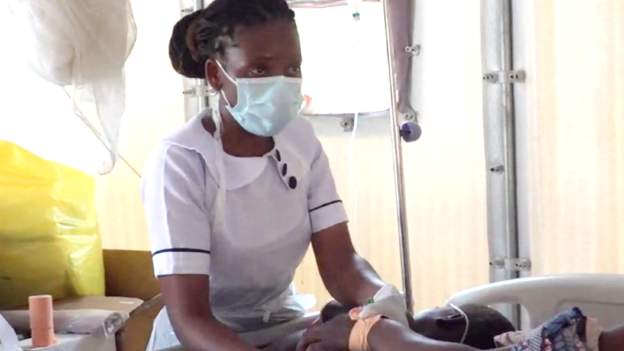l
Nurse Brenda Jingini considers her 55-year-old patient a lucky man – lucky to be alive and recovering from an acute infection of cholera that is surging through communities in southern Malawi.
Too weak to walk or even talk, William Mponda’s family had feared for the worst when he was admitted to Lisungwi community hospital.
For three days he had been complaining at home of severe body pains, was vomiting and had diarrhoea.
“Believe me, he is much better now. In much better condition that when he was brought in. We had to give him emergency care,” Ms Jingini told the BBC.

After a week in hospital he was still weak. As Ms Jingini tried to fit a drip to his arm, he struggled to lift his head. But he dropped back to the metal bed, gasping and sweating in the hot morning sun.
Part of this local hospital has been converted into a makeshift treatment unit for patients suffering from the highly infectious disease.
Transmitted through unclean water, it can affect children and adults, causing severe diarrhoea, and can kill within hours if left untreated.
“When we had just opened the special tent, we had few patients but now the cases are rising. We are worried the situation could get worse,” Ms Jingini said.
The cholera outbreak begun in March in the south of the country after Tropical Storm Ana and Cyclone Gombe caused floods and massive displacements.

The infection has now spread to all of Malawi’s 28 districts. Hospitals and clinics, especially in rural areas, are overwhelmed.
Over the last nine months, more than 250 people have died and more than 8,000 others have been infected.
The World Health Organization (WHO) says it is Malawi’s largest cholera epidemic in a decade. There is concern the coming rainy season could worsen the situation.
At least 12 other countries on the continent are dealing with rising cholera cases – including Kenya, Nigeria, Niger, Mozambique, Somalia, and South Sudan. Experts link such outbreaks to the effects of climate change effects, like droughts and floods.
In May, the health ministry began a nationwide vaccination campaign. But the uptake has been slow with more than 1.5 million people out of a total population of 18 million having been vaccinated.
Rhoda Green did get vaccinated and though she did get cholera, recovered after a day in hospital.
“Those people not vaccinated get very sick while those that have been vaccinated don’t get very sick,” she told the BBC.
“On sanitation we need to take good care of ourselves – like health workers stopped us from drinking water from rivers. We use water from bore holes or tap water from here at the health centre.”
Mr Mponda has also now been vaccinated to stop any further infections – and staff at Lisungwi hospital feel he will make a full recovery.
